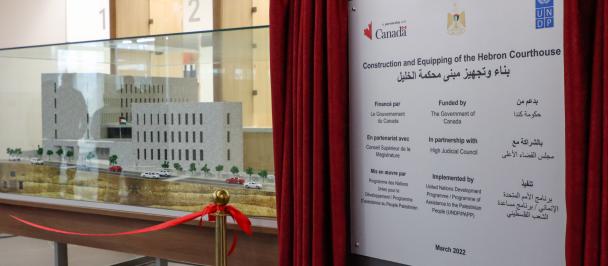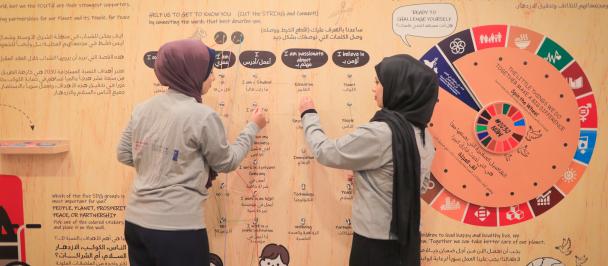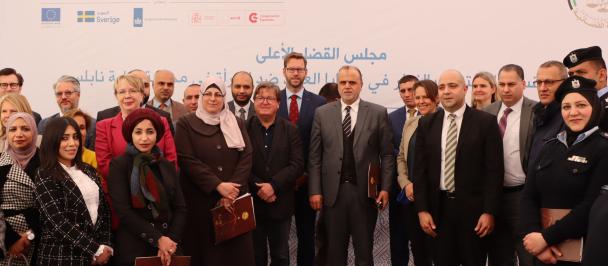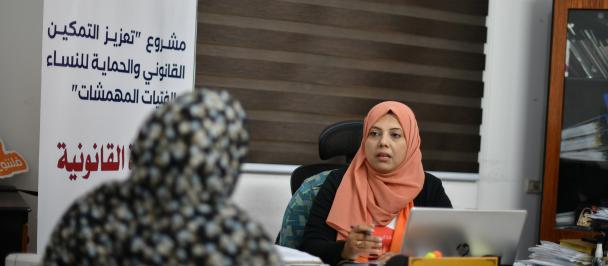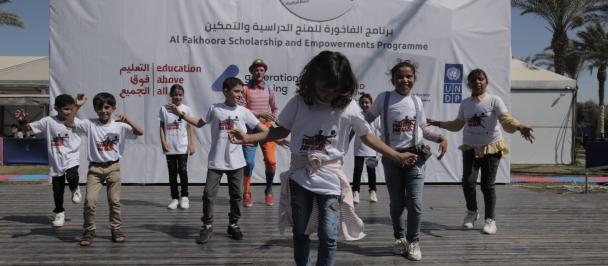Haya studying for her Tawjihi exams in Gaza. © UNDP/PAPP - Shareef Sarhan
Haya, is a 22-year-old young woman from Gaza who is facing a failed marriage and an abusive husband. Haya was married when she was 17 through a traditional family arranged marriage in the Gaza Strip. She left high school for a marriage that lasted less than two years.
“I was taken by love. I thought we are in love and he will respect and treat me well. Soon after our marriage, he was planning to immigrate and leave me here alone with his family. I kept believing he is not going to do it without at least informing me prior. Suddenly, and after the birth of our daughter, he called me in the middle of the night informing me that he was leaving Gaza in the morning, with a promise that he will arrange for me to join him as soon as he arrives”.
Haya’s daughter was only four months old when her father left; leaving Haya with a huge responsibility and a financial burden that she could not handle on her own. "There were days where I could not even find something to eat. He sold my gold during our marriage and then left me with no income. A few months after his immigration, he announced on Facebook that he got married to some other girl. When I called to ask for a divorce, he refused, and so I left to my parents’ house having no idea what to do next”.
According to the Ministry of Social Development, 20 percent of marriages in Gaza in 2019 ended with divorce.
Haya found out about the legal clinic from a friend of hers and started her journey in 2019 to seek legal support. “My family’s economic situation is miserable; I was not able to hire a lawyer to follow-up on my case and I was really surprised and happy that there is such a place that offers vulnerable people with free legal aid services”. Haya visited the legal aid clinic at the Women’s Affairs Centre; one of the legal aid clinics supported by the Sawasya II Programme in the Gaza Strip.
The Sawasya II UNDP/UNWOMEN/UNICEF Joint Programme: Promoting the Rule of Law in the State of Palestine represents the primary programmatic vehicle of the United Nations for advancing the rule of law, gender justice and human rights in the State of Palestine. Sawasya II, through a firmly established partnership with an integrated network of legal aid providers, is able to ensure that the farthest left behind can access the Family and ordinary court systems and have their rights safeguarded. This support has proved particularly critical in ensuring that women with limited financial means can claim their rights - particularly in cases of divorce, custody, maintenance and inheritance – and that children in conflict with the law access fair trial and alternative pathways to detention.
Haya’s legal aid lawyer, who first welcomed her at the clinic said “Haya was skeptical about our ability to help her. She lost trust in everyone around her. We wanted to make her feel comfortable and to reassure her that we can help. We started by filing lawsuits for divorce, alimony, visitation and claim for loss of personal property, in addition to issuing a travel-ban over the little girl as the mother feared that she can be sent to her father by his family”. Haya was granted a divorce and visitation rights at the beginning of 2020. “The moment I received the divorce papers I felt reborn”, said Haya.
With almost 45% of the Gaza population unemployed and 75% living in poverty, Haya and her family were not able to provide for her daughter’s basic needs and therefore was forced to relinquish her custody rights with an agreement for visitation every week.
With the COVID-19 outbreak, the first emergency status was declared in Gaza in March 2020, when cases were discovered inside quarantine centres. Most public service facilities were closed, including Family courts, until 22 April 2020. This has affected hundreds of visitation and custody cases, including Haya’s.
“I have not seen my daughter since 25 May 2020. After the first emergency status was declared, the situation got better as cases discovered were quarantined. I was able to submit an urgent visitation in May to spend Eid Al-Fitr with her. I was able to see her for only two hours,” Haya said in tears.
The grandfather refused sending the little girl to Haya’s place every week. The lawyer notified the Family court in Gaza, and for logistical reasons, that court should notify the Family court nearest to the house, which usually takes additional time. As the grandfather kept postponing, the lawyer submitted a request to the judicial police to enforce the mother’s visitation right.
When that was about to happen, the second emergency status was declared in Gaza and a lockdown was imposed all over the Strip on 25 August 2020. Police, including judicial ones, were executing lockdown safety measures, and courts were closed; postponing all enforcement orders, with the fear of outbreak with the transfer of children from one area to another.
“It kills me every time I hear the word COVID. It did not only impact our health but the family’s well-being as a whole by linking it to my daughter’s presence with us. Now as courts are reopening, I hope I can see her again soon to let her know that I am back at school to complete my Tawjihi high school exam. I will do my best to finish university and find a job to have her back. I miss her so much,” Haya concluded.
Funded by the Governments of the Netherlands, Sweden and Spain, the Sawasya II Joint Programme provided legal aid services including for COVID-19 response, to over 21,000 Palestinians (72% women and girls) in 2020 alone.

 Locations
Locations